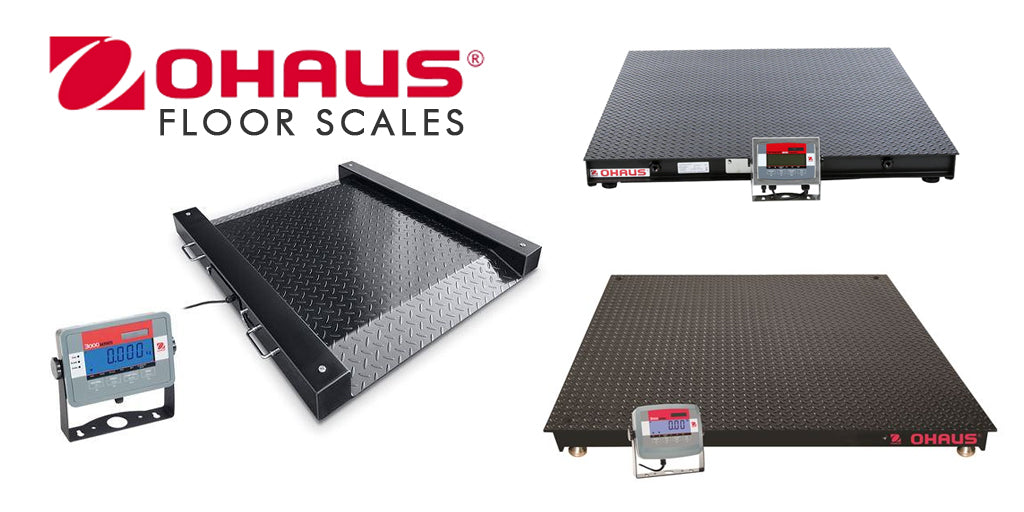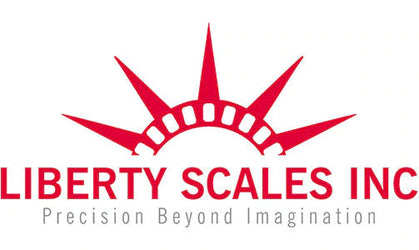
Different Types of Floor Scales | Ohaus Floor Scales
Industrial floor scales are used in a variety of businesses such as chemical, food, medical and pharmaceutical industries. Some of them are also used in the freight industry for weighing air cargo and can withstand weights of up to 20,000 lbs.
Whatever your application needs are, chances are you need a floor scale. However, as you might be aware, there are more than a few types of floor scales. In this article, we will discuss the most common types to help you pick the one meeting your requirements.
What are Floor Scales?
Floor scales are a type of industrial equipment that weigh heavy objects or goods. They are meant to be operated on floor level. From weighing pallets for shipping to carrying out quality control checks of products, floor scales offer many benefits to business owners. High-quality floor scales are made from stainless steel for durability. They have a ribbed, non-skid metal plate to withstand the pushing and shoving of heavy objects. Our VN and VX Series floor scales also come with an internal rechargeable battery to facilitate ease of use.
Types of Floor Scales
There are several types of floor scales, including basic, low-profile, lift scales, high-precision, and heavy-capacity floor scales. The range of options means that you can have your pick based on your requirements. Let's look at the major types of floor scales.
Basic Floor Scale
Basic floor scales are only designed to measure weight. These are relatively simple pieces of equipment with sizes ranging from 3'x3' – 5'x5' and capacities from 1,000 – 2,000 lbs. These pallet scales come with either a stainless steel smooth plate or a mild steel tread plate.
Basic floor scales let you add ramps to their surface. Ramps offer you a convenient option to weigh heavy objects, which cannot be easily lifted onto the scale. Bear in mind, though, that the shortest ramp will at least be 3 feet long. So you'd need to make extra space for ramps.
Low-Profile Floor Scales
Low-profile scales are also limited to weight measurements. Their sides contain load cells and reach the height of a basic floor scale. However, these scales' center is only 2 inches high from the ground to facilitate ease of loading/unloading of pallet jacks.
Low-profile scales deserve your attention if you don't have much space for ramps. Some of them are only 1ft from the ground, cutting the required length of ramps by half. Also, since their sides contain load points, you can place the objects on them and still get accurate weight measurements.
Lift Scales
Lift scales are worth a shot if you need a more hygienic option for weighing. These platform scales allow you to lift the top of their deck, facilitating ease of cleaning of the undercarriage. The deck can either be lifted pneumatically, gas-assisted, or controlled with a remote.
Furthermore, since lift scales are meant for hygienic applications, most come with a standard stainless steel body for washdown applications. Depending on your requirements, you can either add ramps to lift scales or recess them into the floor.
Portable Industrial Floor Scales
Portable industrial floor scales are much similar to their low-profile counterparts. Both have a center that is extremely close to the ground to reduce the length of the ramps. Both also have load cells built into the sides and are incredibly lightweight.
However, unlike low-profile scales, portable scales come with a swivel mechanism. This enables them to be folded and moved away from the workstation when not in use, like compact bench scales. These units are primarily used in the agriculture and livestock sectors.
U Scales
U scales are similar to portable floor scales in that both can be easily transported to and from the workstation. But there is one major difference between the two. Unlike U scales, whose name implies their design, portable floor scales have a square shape.
While their design limits the maximum capacity of these models to 5,000 lbs, it doesn't prevent U-scales from giving you options. Some U-shaped floor scales, for instance, let you convert them into a full floor scale by setting an optional load plate on top of their legs.
High-Precision
As their name implies, high-precision scales are designed to offer highly accurate measurements. They come with a low-profile, drive-on ramp, and have weighing capacities from 150 to 3,000 kgs. This makes them a convenient option for quality control applications in various industries.
High precision floor scales are thus used in food, medical and chemical industries. Depending upon your budget, you can purchase a high-precision scale with a painted or stainless steel finish.
Heavy Capacity
Heavy capacity floor scales are the direct opposite of their high precision counterparts. While the latter sacrifice weight capacity for highly accurate measurements, heavy capacity industrial scales can be used to weigh items above 50,000 lbs.
These units come with bolt-style footing that prevents them from sliding during use. They also have rails to shield the object on the platform from walling by the wayside. A ribbed, non-skid platform reduces/limits slippage of the object being weighed.
Industries That Use Floor Scales
From waste disposal plants to pharmaceutical companies, floor scales are used across a wide range of industries. Let's look at some of the top industries that could benefit from the presence of floor scales on their workstation:
Retail and Commercial
Retail and commercial sectors use floor scales because of their high weighing capacities. Both industries rely on floor scales for weight checking as well as parts counting. This enables the commercial and retail sectors to accurately weigh and distribute their products.
Livestock Sector
Vet and farming sectors usually use floor scales for weighing livestock. The knowledge of the animals' exact weight is crucial to determining their nutritional requirements, health status, and overall well-being. Floor scales also come in handy for weighing feed.
Industrial Sector
A wide range of industries, including manufacturing plants, shipping yards, and chemical factories, take advantage of the versatile nature of floor scales. These and many other industries count on floor scales to weigh crates with large pallets and oversized inventories.
Aviation Sector
Next time the airport authorities tell you that your luggage is overweight, blame floor scales. At the same time, it's essential to keep in mind that the cargo being transported cannot exceed the permissible limit. Floor scales, then, ensure your safety by giving accurate weight readings.
Floor Scales from Ohaus
Regardless of the industry you're a part of, selecting the right floor scale is crucial. The wrong equipment can jeopardize your ability to produce high-quality products, put the safety of your facilities in danger, and increase the risk of accident and, by extension, compliance issues.
Ohaus offers an extensive range of floor scales for your every need. Our VX Series models offer you an economical option for basic washdown industrial applications, while our VN Series floor scales are legal for trade (2500L and 5000L models) and the right choice for your dry weighing needs.
Our Defender Drum Scales combine convenient portability with floor scale capacity. Features like a mild steel platform with treads, built-in front/back access ramps, and the popular T32DM indicator give them the ability to meet your weighing needs.

